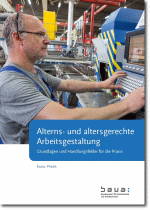Opportunities and challenges of increasing diversity
The world of work is becoming more diverse. Work itself is growing ever more highly differentiated, and demographic change is transforming the age structure in most workplaces. Workforce diversity is consequently of increasing significance. The Federal Institute for Occupational Safety and Health (Bundesanstalt für Arbeitsschutz und Arbeitsmedizin, BAuA) is investigating the opportunities and challenges thrown up by these developments, and seeking to identify factors that help organisations manage various employee groups’ diversity and participation successfully.
What does "diversity" mean?
Diversity can have various dimensions within an organisation. These include age, sex, gender identity, employees’ origins, their levels of education, their professional backgrounds, and sociocultural factors, as well as aspects such as different physical and mental capabilities, sexual orientation, or differing life plans and world views. Frequently, diversity can be perceived to begin with as a “disruptive factor” that leads to losses caused by “friction” in organisational processes. This may happen if employees do not understand their work tasks correctly on account of language difficulties, older workers are no longer able to perform the full range of physical tasks required by their jobs, or flexible working time models make it nearly impossible to hold team meetings.
Nonetheless, provided suitable measures are implemented to promote and shape diversity, targeted action can be taken to forestall such challenges. Employees and employers alike can benefit from a diverse workforce - because it opens up a wider spectrum of perspectives, boosts organisations’ innovativeness, and enables them to adapt better to different market requirements.
Research for diversity
BAuA is investigating the correlations between working conditions and health among various employee groups. The aim is to acquire a better understanding of specific groups’ needs and vulnerabilities, and enhance their employability.
This context-sensitive research is looking at diversity as it interacts with working conditions, organisational factors, and societal dynamics. For example, hospitals’ commercial orientation towards the flat rates paid for providing specific kinds of treatment influences the working conditions experienced by their nursing staff.
Demographic change
In view of Germany’s population structure, the repercussions of demographic change for the labour market deserve particular attention. Ageing workforces and shortages of skilled workers make it imperative to manage working conditions both age-appropriately and ageing-appropriately so that employees are able to do their jobs healthily for many years. Maintaining and promoting individuals’ workability and employability throughout their careers is the decisive strategy for organisations that wish to do this. Our research into this topic has included the validation and practical implementation of the Later Life Workplace Index, an instrument that measures how fairly organisations deal with age and ageing-related issues.
Making work human-centred
We encourage the take-up of “differential work design” as a methodology that, among other things, makes allowances for individuals’ competences, needs, and potential, as well as the support they require. People with disabilities benefit from this approach especially. New technologies allow targeted work design and carefully customised support, increasingly enabling employees with health-related impairments to their physical functions or bodily structures to participate in working life just like people without such impairments.
In particular, AI-based assistive technologies allow employees with physical and mental impairments or disabilities to gain more job control and autonomy.
When it comes to inclusion and technology, BAuA is researching the conditions under which new technologies become factors that promote human-centred work design for people with impairments and when they actually function as barriers. At the same time, aspects of the cooperation seen between people with and without impairments in teams are also being illuminated.
RTW and workplace reintegration
Another focus is on reintegration processes after employee absences and the effectiveness of return-to-work (RTW) measures. The research line Strengthening RTW Management and Promoting RTW Processes is concerned with describing and analysing what happens when employees come back to the workplace after time off, how organisations are currently handling phased reintegration, and the effectiveness of RTW measures (e.g. intensified aftercare at psychiatric outpatient clinics).




